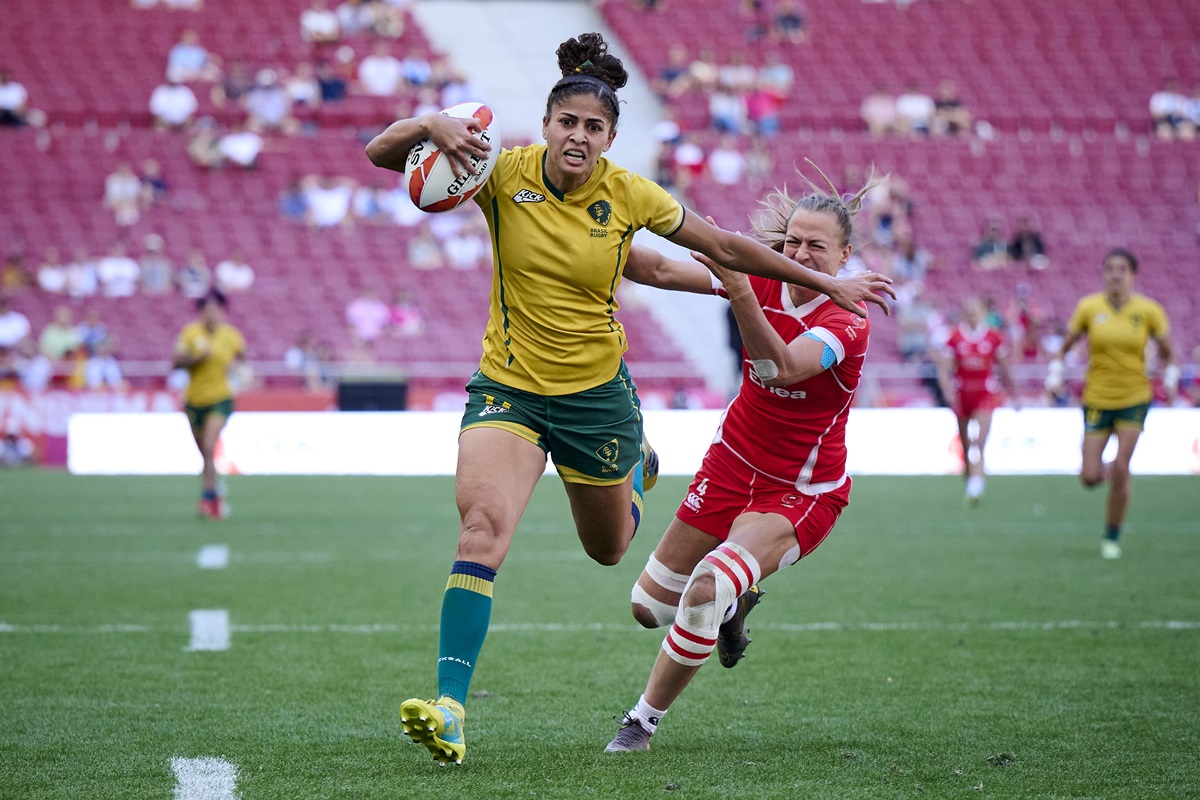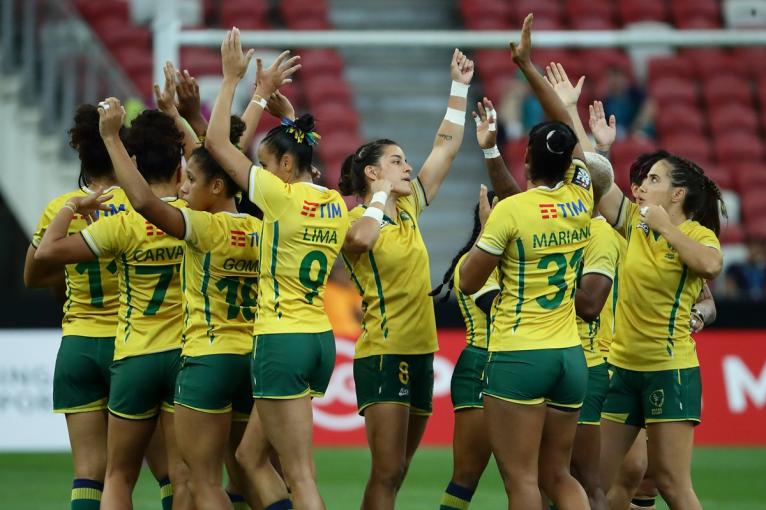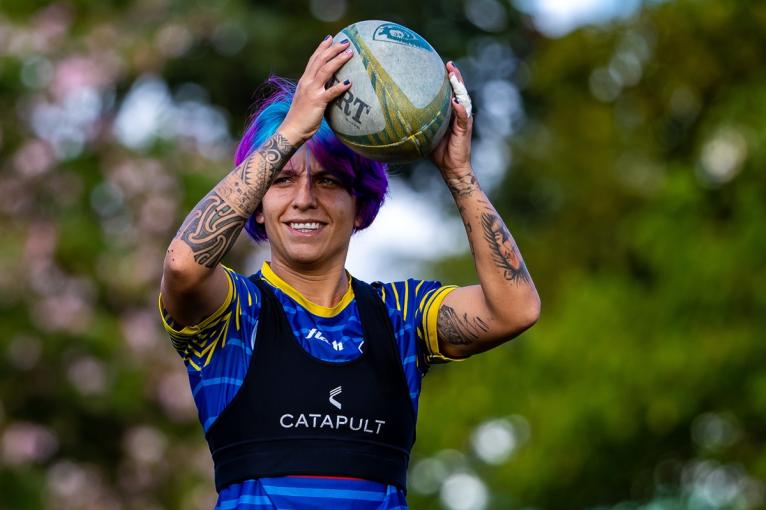Track & field is consistently the most watched event at the Olympic Games. And its predominance throws an athletics filter over every other sport.
When rugby made its Olympic debut at Rio 2016, I got in a heated debate with a colleague over which member of Jamaica’s 4x100m relay team stood the best chance of converting to rugby sevens. For the record, my answer was not Usain Bolt but ‘The Beast’ Yohan Blake, who would have made a very, very fast – and powerful – hooker.
Such conversations are all part of the fun of an Olympic Games so let’s open up another. Which rugby sevens team would have the best chance of competing in the 4x100m relay at Paris 2024?
I nominate the Brazil women’s sevens team. Australia, Team GB and USA would put out decent 4x100m squads, no doubt. But I think no one could live with Gabriela Lima, Thalia Costa, Yasmin Soares, and Bianca Silva on the anchor leg.

Get the baton round safely, and it really wouldn’t be a contest. They are just too quick.
And that makes them incredibly dangerous opponents for every other rugby sevens team in Paris.
Brazil may be the least developed rugby nation at these Olympic Games – but, with the speed they have, they can cause anyone outside of New Zealand and Australia a real headache. This season alone they’ve beaten Fiji, Ireland (twice), Spain (twice), Japan (three times) and South Africa (twice).
Not bad for a rugby programme that was only set-up in the build-up to Rio 2016 to honour the automatic place they were given as host nation.
Brazil’s captain in Paris will be 33-year-old Luiza Campos. Campos is not one of the speedsters – she sees herself as the ‘conductor’ for others – but she is as excited as anyone about the sports cars she has around her.
“They’re freaking fast!” she exclaimed. “Tahlia [Costa] is freaking fast, she came from track and field when she was young.
Thalia Costa is always a danger for any defender! ⚡️🇧🇷#Rugby7s | @brasilrugby pic.twitter.com/84ATZVjyhc
— Rugby Sevens (@SVNSSeries) July 8, 2024
“She couldn’t catch a ball to begin with but now she’s amazing. Gabi [Lima] was from track too – she’s only in her third or fourth year of rugby now but is rapid. Jasmin [Soares] is the most recent introduction to the team – is also fast and a really good stepper.”
Luiza was speaking about the newer names in the team but, of course, there’s also Bianca Silva. Silva is almost as woven into the Brazilian shirt as Campos, having made her debut in 2018, and soon giving life to the idea that Brazil produce really, really quick players.
But speed alone isn’t enough to build an elite rugby sevens team, as this Brazilian squad has proven to be. Since Rio 2016, Brazil have earned core status on the main sevens circuit in six out of eight seasons, as well as qualifying for Tokyo, and now Paris.
Brazilians are naturally very loud, that’s their style
A key element in that success has been establishing a Brazilian style of play that goes beyond just being fast. Surprisingly, one of the key architects of that has been an Englishman from Manchester, called William Broderick.
Luiza explained: “We had had other coaches who wanted us to play like New Zealand or France but we didn’t have the skills to play like New Zealand. William brought in the idea of playing in a Brazilian way.”
Broderick – who has been Brazil’s coach since 2021 after winning nine caps for the national team as a player – remembers things similarly.
“They needed to gain a bit of pride firstly,” Broderick said. “I felt they couldn’t just idolise New Zealand. Some players in training wore New Zealand shorts. So we developed our culture.
“That meant we had no restrictions on being Brazilian: playing loud music and dancing. Brazilians are naturally very loud, that’s their style.”

The next part was accepting the team’s lack of rugby experience relative to their rivals, and working round it.
“At times we have brought in girls who have been playing rugby for only a year, so you can’t expect them to play what they see because they hadn’t played the game enough.
“Instead we defined three simple roles the players were expected to play. Nothing complicated but if everyone does their job really well, the structure works.
“Australian rugby is really big on this. Structure can allow you to think less, and play more. Our structure was for what they needed to do on the pitch, not where they needed to be.”
Broderick’s role-based structure is designed to unleash his stable of speedsters, and the abundance of speed he has in the squad means he will always have two out-and-out sprinters on the field at any one time.
Most teams do not have that luxury.
Structure can allow you to think less, and play more
The pay-off for having so many fast-twitch fibres, is that Brazil are under-strength in the bulk department, especially as Rafaela Zanellato is out injured.
“My biggest regret is that we are playing these Olympics without her,” said Broderick. “She is a defensive animal and absolutely world class.”
Zanellato’s absence will put greater onus on Mariana Nicolau and Campos to get through even more of the grunt work in their pool matches against France, USA and Japan.
In this regard, Campos comes in for special praise from her coach. “She was forged in the furnace but operates in the shadows,” he said. “You won’t see her score but you will see her hitting rucks, making tackles and linking with others.”
Paris will be the last Olympic Games for Campos, as it will likely be for fellow three-time Olympian Raquel Kochhann. Both players have been synonymous with Brazil’s successes over the last eight years but they stand out for another reason as well: their haircuts. Kochhann’s is a rigid mohawk, whilst Campos’ is consistently changing colour.

Campos professed that neither of them are sure why they started doing it. Once they did, however, the habit stuck – “It’s my way to not get bored,” she said.
When we spoke, Campos’s hair was blue, green and purple. “But I will do it again before the Olympics,” she promised.
“The girl that does my hair (team-mate Marcelle Souza) needs to be around. Marcelle suggests things and I tend to say ‘let’s go for that’.”
Hopefully her Paris snip will go better than in Tokyo. “In Tokyo, I had orange hair. We were trying to do flares but it went wrong!”
All we can be sure of is that Brazil’s opponents are in for a truly horrible 14 minutes chasing them across Paris.
Whatever happens at the Olympics, Campos will retire at the end of the 2025 season. She’s holding on for one extra season to help the team’s transition into a new era.
Kochhann, too, may struggle to make it to another Games, meaning Paris is likely to mark the end of the first vintage of the Brazilian women’s sevens team of the Olympic era.
Campos is not holding out for an Olympic ending of the Hollywood kind. Although she thinks the team are ‘in the best shape we’ve been in’, she speaks of the quarter-finals as being a realistic summit for Brazil’s ambitions.
To achieve that, Brazil would likely have to beat either France or the USA – with a victory over either nation guaranteed to be built on Brazil’s fast four of Lima, Costa, Soares and Silva.
After that, who knows? All we can be sure of is that Brazil’s opponents are in for a truly horrible 14 minutes chasing them across Paris.


Comments
Join free and tell us what you really think!
Sign up for free